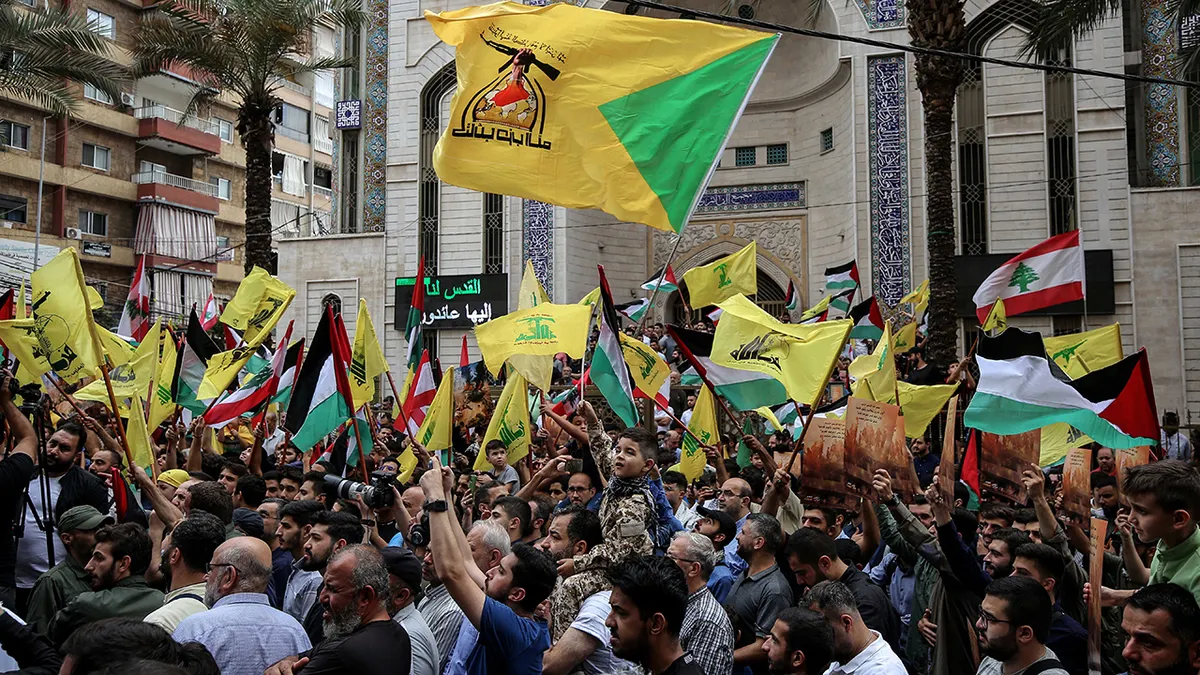
Lebanon’s capital spent Tuesday on edge while the Council of Ministers convened to debate the most explosive item on its agenda: a proposal to reaffirm that all arms must be under state control. The discussion, driven in part by growing U.S. pressure to curb Hezbollah’s military autonomy, has revived memories of the group’s street muscle and sparked speculation that its supporters might again mobilise the so-called “Black Shirts.”
Motorbike parade heightens anxieties
On the eve of the session, dozens of riders waving yellow Hezbollah flags revved through the party’s stronghold in Beirut’s southern suburbs. The convoy never entered other neighbourhoods, but its timing was read by many as a warning shot to opponents advocating disarmament.
Although no similar rallies were recorded on Tuesday, small gatherings kept nerves frayed:
- Baalbek–Brital highway: a cluster of young men appeared to be organising a pro-Hezbollah march.
- Khaldeh, south of Beirut: another group, dressed head-to-toe in black, assembled near the coastal highway hours before ministers met. Passers-by feared a replay of 2019, when black-clad Hezbollah supporters attacked anti-government protesters downtown.
The Khaldeh incident turned out to be a marketing stunt — a fried-chicken chain celebrating one million Instagram followers with balloons and fireworks. Still, many Lebanese asked why the event was scheduled precisely as the cabinet convened and whether the black outfits were an accident or a calculated signal.
Cabinet under the microscope
Inside Government Palace, ministers faced unprecedented outside scrutiny. Washington has hinted that aid and diplomatic support could hinge on Lebanon articulating a clear path to rein in Hezbollah’s arsenal, which rivals the army’s and is integrated into the group’s regional confrontation with Israel.
Some cabinet members favour a carefully worded pledge to craft a “national defence strategy” — a formula Speaker Nabih Berri has championed for years. Others, buoyed by international backing, want a bolder statement that explicitly sets a timetable for handing heavy weapons to the Lebanese Armed Forces. The text’s final shape will signal whether Beirut is ready to confront Hezbollah head-on or will continue the long-running balancing act between state sovereignty and the party’s de facto military autonomy.
Why the “Black Shirts” matter
The term resurfaced after Hezbollah fighters in black shirts roamed central Beirut during the 2019 protest wave, beating demonstrators and sending them fleeing from Martyrs’ Square. The image crystallised public fears of a paramilitary force willing to wield intimidation at critical political junctures. Every time black-clad groups appear, many Lebanese read it as a barometer of Hezbollah’s readiness to enforce red lines in the street rather than through formal politics.
A fragile calm — for now
For much of Tuesday, Beirut’s main arteries remained calm; security forces kept a visible presence near government buildings, and Hezbollah media channels urged supporters to stay alert but restrained. Yet the atmosphere was one of watchful waiting. Analysts warned that even a minor clash could spiral, given the unresolved border tensions with Israel and deepening economic misery at home.
“There is a combustible mix of foreign pressure, domestic grievances, and a history of street violence,” a Beirut-based political scientist told Erem News. “If the cabinet wording is perceived as a direct challenge, Hezbollah may mobilise, whether through an organised march or more subtle shows of force.”
What happens next?
- Cabinet statement: The government is expected to issue a communiqué late Tuesday or Wednesday. Its language — especially any reference to “exclusive state weapons” — will be parsed for signs of confrontation or compromise.
- Hezbollah reaction: The party’s leadership has so far avoided inflammatory rhetoric, but any hint of disarmament deadlines could trigger protests akin to the motorbike parade or more visible black-shirt deployments.
- International follow-up: U.S., French and Arab envoys will gauge whether the statement satisfies their calls for a roadmap to limit Hezbollah’s arsenal, a step they argue is crucial to unlocking economic assistance.
For Beirut’s residents, the immediate concern is simpler: whether tonight’s cityscape will remain quiet or echo once more with roaring engines, black flags and the spectre of militia rule creeping back into the streets.
